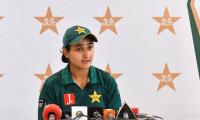The good news for students of law and the constitution, struggling to find consistency and coherence in the Supreme Court’s recent jurisprudence on disqualification of parliamentarians, is that we are not alone.
Justice Faez Isa’s opinion in the Sheikh Rasheed disqualification matter and the Islamabad High Court’s full bench ruling disqualifying Khawaja Asif with a ‘heavy heart’, believing it was applying the law as laid down by the SC only to be overturned later, suggest that some on the bench are also struggling.
Starting with disqualification cases employing Article 184(3) during CJ Iftikhar Chaudhry’s time, the scope of authority vested in the SC and the manner of its exercise have probably been matters of more significance for students of law than the eligibility or desirability of a particular MP to serve as a legislator. In his minority opinion, Justice Isa has cogently articulated the issues that bear on the minds of many who are interested in discerning the text and spirit of our constitution and its scheme of separation of powers.
A legal system presumes that if the law is sufficiently clear, citizens (or their majority) will order their lives in accordance with it. If any disputes arise, courts act as arbiters amongst citizens or between citizens and the state. As the ultimate court, the SC has the final word on what the constitution means. The law it lays down is binding on everyone. Thus, the SC is responsible for ensuring legal certainty, without which rule of law and rule of men are hardly distinguishable. It is here that SC’s recent jurisprudence is wanting.
In his majority opinion, Justice Azmat Saeed’s argues that, “in our legal system, law evolves brick by brick and from judgment to judgment. If the judgments pertaining to electoral disputes rendered by this court are carefully read, objectively understood and the ratio thereof correctly identified, it would be clear and obvious that principles of law, in this behalf, appear to have been settled and consistently applied to the facts of each individual case.” This is how it is meant to be. But is this how it is?
Justice Saeed himself identifies the ‘test’ prescribed and applied by the SC in the disqualification cases as follows: “Where a misstatement or an inaccuracy or concealment is established, the candidate/member would always have the opportunity to offer an explanation. Such explanation may or may not be found acceptable.” It doesn’t say if every inaccuracy or misstatement will attract disqualification proceedings or only material misstatements, and if so what test of materiality will guide the courts.
It doesn’t say if penalty of disqualification requires mens rea. If an omission isn’t a strict liability offense, as Justice Saeed has ruled, and an MP has the right to explain himself, how will the SC determine the validity of an explanation without trial (guaranteed under Article 10A)? If there is no objective standard for which omission attracts disqualification and which doesn’t, and what sort of explanation is acceptable and what isn’t, won’t the fate of MPs hang on subjective opinions of judges on the bench?
Since Nawaz Sharif’s disqualification, the SC has been at pains to explain what it did and why, and how it has been doing the same thing in subsequent cases (without much success dare one say). In Panama I, the reasoning of the judges who disqualified NS in round one was most candid. Based on what they heard, they formed a subjective view that NS was untruthful, and said so. Panama II’s reasoning was unconvincing for its foundation wasn’t the London flats or dishonesty but an omission that seemed trivial.
The SC has since been trying to carve objective tests out of its inherently subjective determination in the Panama case, which has created further confusion. Four major disqualification cases later, all basic questions requiring interpretation of constitutional text and scheme of separation of powers that existed at the time of Panama still remain unanswered. Justice Isa’s minority opinion is the latest reminder that, by pushing them under the carpet, the issues won’t go away. He raises many questions, five of which are as follows:
“Q1: Does every nondisclosure or misdeclaration in the nomination form result in the disqualification of a candidate, or only those whereby one has circumvented some inherent legal disability to participate in an election?
“Q2: If a petition does not disclose the particular facts, on the basis of which disqualification is sought, can these be considered when subsequently disclosed in the affidavit-in-evidence of the petitioner or which may otherwise be discovered during the hearing before the tribunal/court?
“Q3: Does Article 225 of the constitution exclude the application of Article 184(3) of the constitution to election disputes?
“Q4: If the answer to the foregoing question is in the negative, then is an election dispute regarding an individual’s qualification or disqualification a matter of “public importance” which requires the “enforcement” of a fundamental right and if so can it be determined under Article 184(3) of the constitution?
“Q5: If the answer to the foregoing question is in the affirmative, are the procedural and evidentiary rules governing election petitions and appeals under the ROPA the same as those governing petitions under Article 184(3) of the constitution?”
Addressing these questions is essential – not to benefit individual politicos, but because the underlying issues are much larger than holding politicos to account. We need clarity and consensus over who is meant to do what in this polity – and how. Does the constitution vest power in the judiciary to rule on the issue of disqualifications or has the SC exercised its authority to interpret the constitution such that it has entered the domain reserved for other institutions such as the Election Commission and parliament?
If the letter and spirit of our constitution envisage that the SC in its original jurisdiction is to rule on the right and eligibility of public representatives to continue to serve in parliament, how should one understand Article 225 that vests in Election Tribunals the exclusive jurisdiction to decide election disputes, or Article 63(2), which states that if a question arises regarding an MP becoming disqualified after election, the speaker of the NA or the chairman of Senate will refer it to the ECP for a decision?
If the SC is going to exercise 184(3) powers to issue writs of quo warranto removing elected representatives from the executive and legislature, on what basis will it exercise such discretionary authority? In the Sheikh Rasheed case, Justice Saeed cites the case of Sher Alam Khan to emphasise that where an issue of disqualification of an MP comes before the SC in any form, it not just has the power but also the obligation to exercise 184(3) powers (as the SC has assigned itself the obligation to ensure the legislatures’ purity).
Justice Isa, on the contrary, seems to support exercise of restraint in disqualification matters. He cites Muhammad Siddique Baloch where it was held that, “in cases involving a finding of fact about disqualification of a returned candidate in election matters, such finding must be based on affirmative evidence and not on presumptions…” and “any reasonable hypothesis available in the recorded evidence to avoid the disqualification of the returned candidate ought to be adopted by the court of law.”
The SC’s insistence that it is a court of law that can toss out elected MPs in its original jurisdiction, even suo motu, without trial and without any right of appeal, is worrisome as it disturbs the balance between representative and non-representative institutions. That suo-motu powers are completely unstructured and their scope and manner of exercise depends completely on the person of the incumbent CJ, and that once exercised no objective standards guide exercise of authority by the SC in disqualification matters, tends to dilute the distinction between legal and political accountability.
The questions raised by Justice Isa will need to be answered. Whether that happens during the current CJP’s term or that of any of his successors (including Justice Isa) remains to be seen.
The writer is a lawyer based in Islamabad.
Email: sattar@post.harvard.edu
A representational image showing residents walking at a wholesale market in Karachi. — AFP/FileOnce again there is...
A representational image showing late Pakistani human rights activist and Supreme Court lawyer Asma Jahangir. —...
A representational image showing a security personnel sanding guard beside a ship carrying containers at Gwadar port....
A health worker administers polio vaccine drops to a child during a door-to-door polio vaccination campaign in Lahore,...
Armed militants of the banned Tehreek-e-Taliban Pakistan pose for a photograph in Orakzai Agency. —...
An aeroplane of the national flag carrier of Pakistan is seen in this file photo. — AFPWhile Pakistan considers...







